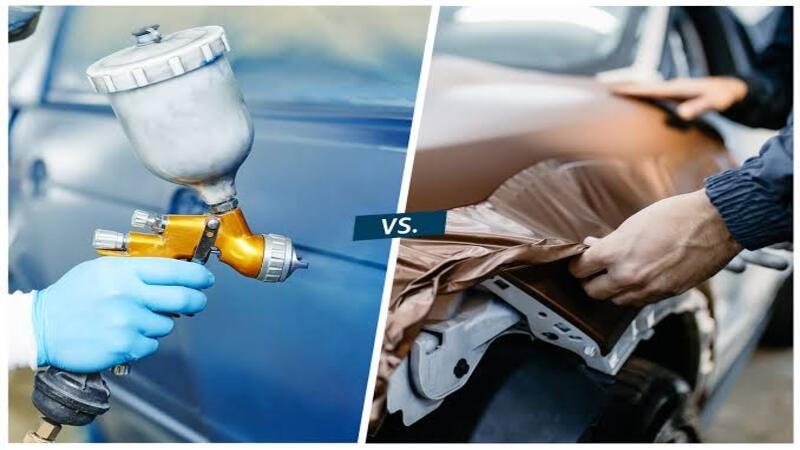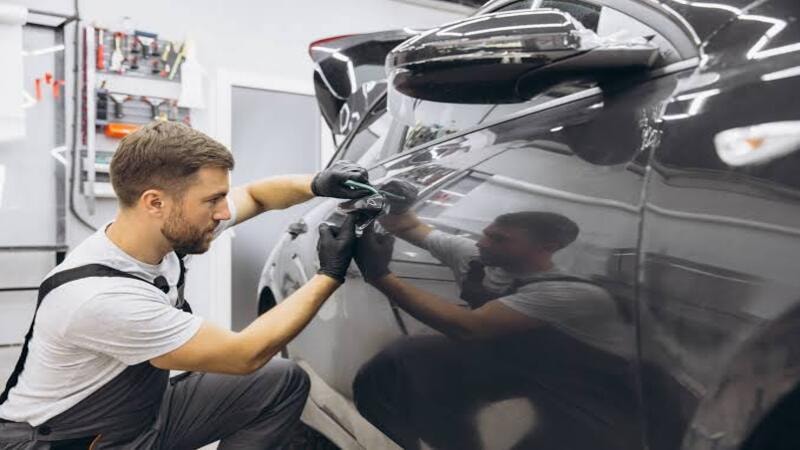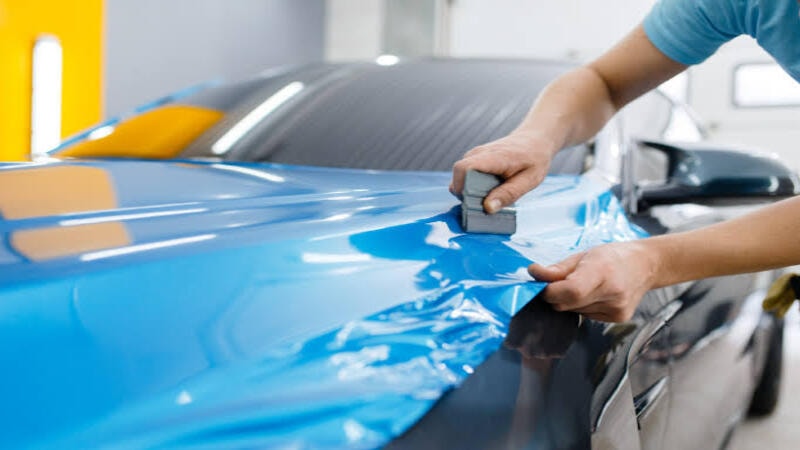Ever thought about changing your car’s look without repainting? Car wrapping is a trendy way to refresh your vehicle. It offers bold colors, unique designs, and even branding options. More and more car owners and businesses are jumping on this trend. But is it the right choice for you? Let’s explore the pros and cons of wrapping your vehicle now!
What is a Vehicle Wrap?

Vehicle wraps are adhesive decals that cover part or fully wrap a vehicle’s exterior. They provide an alternative to paint with endless design possibilities. Options include glossy, matte, chrome, gradient, or graphics.
Both individuals and businesses use wraps to customize their vehicles. They are cost-effective, long-lasting, and easy to change. Businesses use them for mobile advertising. With 76% of American workers commuting daily, truck wraps offer unmatched brand exposure. Wraps protect the vehicle’s original paint from wear and tear. They offer a fresh look without a permanent commitment.
5 Benefits of Vehicle Wraps
Cost-Effective Alternative to Paint

Everyone wants their automobiles to be appealing on a low budget. But the traditional and pricey painting job is not what you want. Professionally, painting your entire vehicle will cost you anywhere between $3500 to $10,000. Car wraps are a cheaper option. The cost of wrapping a car starts from $2,500 and reaches up to $6000. An original paint job requires a cost that is double the price of wrapping.
A wrap installation saves half the costs that normal automotive paint services would cost. Vehicle wraps require little to no maintenance. High-quality car wraps from reputable manufacturers stay in great condition for up to five to seven years. The wrapping combines fashionable design with cost-effective pricing to become a popular first choice for many.
Customization and Personalization

Vehicle wrapping brings outstanding custom options compared to custom paint jobs. Vehicle wrapping presents custom options based on pattern, textural, and color design. Wraps can be designed to feature any type of branding or message. These wraps are adaptable to any vehicle size and shape, ensuring a perfect fit.
You can also create the look of expensive materials like carbon fiber, chrome, or leather with vinyl wraps. Or you can choose to make good use of partial wrap ideas to transform your car at a lower cost.
The finishes available in the market offer multiple options that include satin, matte, and textured effects. Each choice allows you to personalize your vehicle to get the desired finish. And you can also find a unique color for your car. Car wraps deliver effective promotional options for businesses in addition to making exterior transformations.
Businesses can put advertisements on company vehicles and advertise their brands through mobile marketing. For example, food truck wraps can make the food truck turn heads, attracting more customers and promoting the brand. On average, a $20,000 investment buys 8.4 million yearly impressions with vehicle wraps. Vinyl wraps are a practical, stylish way to transform the look of any vehicle.
Protection and Durability

Over time, your car’s paint may degrade due to wear and tear. It’s important to protect it from scratches, dents, rust, and sun exposure. A vehicle wrap serves as one of the best options to preserve the underlying paint and look of your whole car. This protection can save you from expensive repair bills.
PPF is another popular choice to protect the car’s paint while upgrading its look. You can compare the differences between PPF and vinyl wraps to select a suitable one.
If you plan to sell your car in the future, a well-maintained exterior will help. The wrap prevents damage that could lower its value. By protecting the original paint, it’s easier to replace the wrap when needed. This adds to the car’s resale value and keeps it in good condition for years.
Cost and Installation

The cost of car wraps ranges between $2,500 to $6,000. The overall expense depends on the vehicle dimensions as well as product material standard, installation expertise, and design intricacy. The cost increases when vehicle wraps become larger in size or they incorporate intricate design elements.
The major difference between a paint job and wrapping is how quickly wraps can be applied. Plus, wraps can be effortlessly removed with a heat gun and other proper tools without needing professional help in most cases. Wrapping costs fluctuate because of the numerous elements, but being simple to install and remove validates their popularity as a vehicle design option.
Longevity and Durability

Good maintenance practices keep the professional car wrap intact throughout 5 to 7 years of service. Regularly washing the wrap and immediately removing insects and bird excrement helps extend its lifespan. These practices you perform on your vehicle play a significant role in extending the duration of your wrap.
The wrap’s longevity is also affected by the amount of time it spends outside. The less the vehicle is exposed to harsh conditions, the longer the wrap will hold up. Proper care can significantly improve its durability over time, making it truly a worthwhile investment.
3 Drawbacks of Vehicle Wraps
Quality and Installation Issues

A vinyl wrap’s longevity mainly depends on what quality of material used. The removal of subpar vinyl can lead to severe damage. This may include paint lifting or excessive adhesive residue. Improper installation of vinyl film can also lead to long-term paint damage. If the wrap is not applied correctly, it may lift or create friction. This can cause surface imperfections. The risk increases when the installation environment is uncontrolled, such as with improper temperature or humidity.
Vinyl wraps are a low-cost alternative to traditional paint jobs. However, they come with little more upfront cost. This is especially true for truck-wrapping and custom designs. Material costs and more labor for installation contribute to the higher cost. Even high-quality wraps are not immune to wear. Exposure to UV light, road salts, and abrasions can cause fading or cracking. These factors can reduce the wrap’s lifespan and effectiveness.
Maintenance Requirements

To maintain a fresh appearance, vehicle wraps need proper care. Using gentle cleaning products helps to prevent fading and peeling of the wrap. Keep away from using strong chemicals or abrasive cloths because these may damage your wrap. The protective layer of the waxing can shield the wrap against the elements and UV rays. Testing for scratches and lifts requires regular inspection since it helps identify problems beforehand. Parking cars under shaded spots and covering them with a protective car cover helps reduce the effects of sunlight.
Removal and Replacement

The unwrapping of a car wrap demands extensive work. The total duration to remove vehicle wrap falls within three to four hours of work. The expense to remove a vehicle wrap typically falls between $500 and $1,000. The process becomes pricier when unwrapping gets tricky.
Visit a professional once you make up your mind to remove your vehicle wrap. Professionals who perform the removal of wraps have the proper skills and tools for the correct procedure. To avoid scams, always choose certified experts with proven experience.
The paint underneath the wrap might get damaged if improper removal techniques are applied. Skin damage, such as minor scratches, together with peeling, may also happen. The underlying paint may need restoration after unwrapping. The options to repair damaged wrapping are minimal. You should consider this factor prior to applying a vehicle wrap.
FAQ
Q. Do vehicle wraps affect the vehicle’s performance?
The application of vehicle wraps leaves no negative impact on the performance of vehicles. The addition of vehicle wraps brings no weight increase or drag.
Q. Are vehicle wraps environmentally friendly?
Most vehicle wraps feature sustainable raw materials as their manufacturing materials. Vehicle wraps serve as sustainable alternatives that get recycled while offering better sustainability. While painting, the job generates waste together with chemical use.
Q. Can you provide free samples of your car wrap?
Yes, we can provide free samples before you place your order. Just tell us what color you need and your shipping address.
Q. How are you different from other suppliers?
With more than 20 years of production experience, we know how important product quality is to our customers. Good car wraps will make the car owner like it more and make the installation easier.
Conclusion
Vinyl wraps provide a stylish, customizable, and protective solution for vehicles, offering a sleek appearance while preventing the paint from damage. Easy to remove and maintain, they are ideal for both car enthusiasts and businesses. Despite some considerations like quality of material and costs, the benefits often outweigh the drawbacks, making them a smart investment for your car in the long term.
Carlike Wraps: Smart Upgrade for Your Business’s Branding!
Transform your business with Carlike wraps! Carlike specializes in high-quality wraps that not only protect your vehicles, but also make your cars turn heads, enhancing your brand’s visibility. Whether you’re looking to advertise your business or give your car a stylish makeover, our expert team provides custom solutions.



